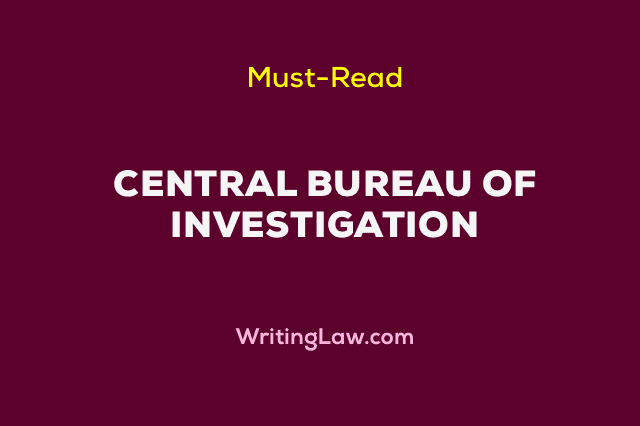
The Central Bureau of Investigation (CBI) was established in the year 1963. Before that, a body worked for vigilance cases known as the Special Police Establishment, which afterwards merged with the CBI in 1963.
The Central Bureau of Investigation is not a statutory or constitutional body but derives its roots from the Delhi Special Police Establishment Act, 1946. CBI is a non-statutory body. We can say that the CBI is the primary investigating agency of the Indian Central Government.
Composition of CBI
1. There shall be a director of CBI who heads the department. The union government shall appoint the Director based on the recommendation report given by a three-member committee (Prime minister, leader of the opposition party in Lok Sabha, and CJI of India).
Note: If there is no recognised leader of the opposition party in the Lok Sabha, then any single leader of the largest opposition party can be a member of the committee.
2. There shall be joint directors, deputy inspector general, and superintendent of police.
3. There shall be a Directorate of Prosecution, whose work will be to look after the cases registered under the Lokpal and Lokayuktas Act. The Directorate of Prosecution shall not be a person below the rank of Joint Secretary to the union government.
4. The union government shall also appoint persons for the rank of SP and above to work as subordinate officers with the Commissioners and Director.
Functions of CBI
The role of CBI is to uphold the spirit of the Constitution and provide a far-sighted vision to the police forces to act as an agency for the enforcement of laws and prevention of crimes.
The functions of the CBI are as follows:
1. Its main task is to investigate violent crimes through an effective system and high technology.
2. It helps in dealing with and combating cybercrimes and social platform crimes.
3. It is there to help, supervise, and support police organisations in investigating high-suspension cases.
4. It investigates cases of corruption, bribery, misconduct, and misbehaviour of union government employees. It works under the superintendence of the Central Vigilance Commission.
5. It investigates serious crimes committed by high-level criminals affecting national and international cooperation or national peace.
6. CBI may also take up a case at the State government’s request if the matter relates to public importance.
Note: The same has happened in the case of Sushant Singh Rajput’s case. The matter has been transferred to the CBI at the request of the Bihar government. And SC has further directed Mumbai police to give a status report of the case.
7. It takes up cases on the direction of High Courts and Supreme Court as well. But in case of direction by the court, consent of the concerned state is not required.
8. The CBI in India acts as an agency or National Central Bureau of Interpol (an international organisation that helps police forces of different states to investigate and solve crimes).
9. But before conducting any investigation or inquiry, the CBI is supposed to obtain prior permission from the Central government if the offence is committed by the joint secretary or any person of the above rank.
10. It plays a role in protecting human rights, the environment and those criminals who are causing damage to the country.
Organisation of CBI
Presently the CBI has the following divisions that are working under the union government:
- Anti-corruption Division
- Economic offences Division
- Administration Division
- Special Crimes Division
- Directorate of Prosecution
- Central Forensic Science Laboratory
- Policy and International Police Cooperation Division
- 18 Most Important Amendments to the Indian Constitution - 12th August 2023
- 8 Kinds and Theories of Punishment - 22nd July 2023
- What Is the Meaning of Res Judicata in Civil Procedure Code? - 22nd January 2023







